Classroom Management Plan: Philosophy and Theory Report Analysis
VerifiedAdded on 2021/02/20
|10
|2808
|110
Report
AI Summary
This report provides a comprehensive analysis of classroom management, focusing on the underlying philosophies and theoretical frameworks that contribute to effective teaching and a positive learning environment. It begins by exploring the philosophical underpinnings of education, examining the nature and needs of young people, the crucial role of the teacher, and the importance of behavior management. The report delves into the reasons behind disruptive student behavior, the complexities of student conduct, and the intended outcomes of discipline, advocating for a balanced approach to teacher control. Furthermore, it investigates the conditions necessary for student learning, instructional management strategies, and the views of young people and their learning styles. The report then transitions to a discussion of key classroom management theories, specifically Haim Ginott's Congruent Communication's Theory and Jerome Freiberg's Consistency Management Theory. It explores the principles of each theory, highlighting their alignment with the report's philosophical perspectives and emphasizing their practical applications in fostering a cooperative, disciplined, and engaging classroom environment. The report emphasizes the importance of communication, consistency, and proactive strategies in creating a conducive setting for student success.
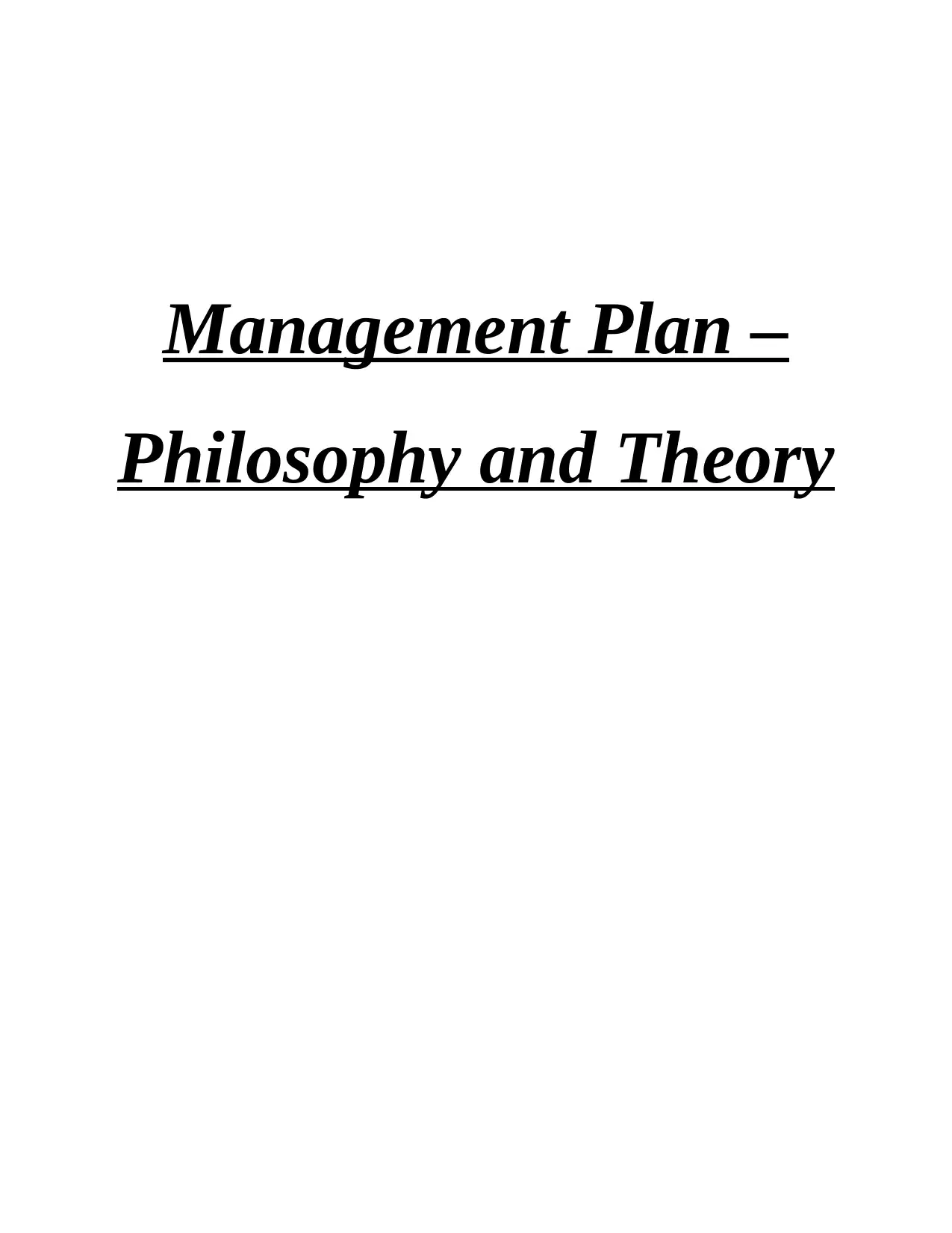
Management Plan –
Philosophy and Theory
Philosophy and Theory
Paraphrase This Document
Need a fresh take? Get an instant paraphrase of this document with our AI Paraphraser
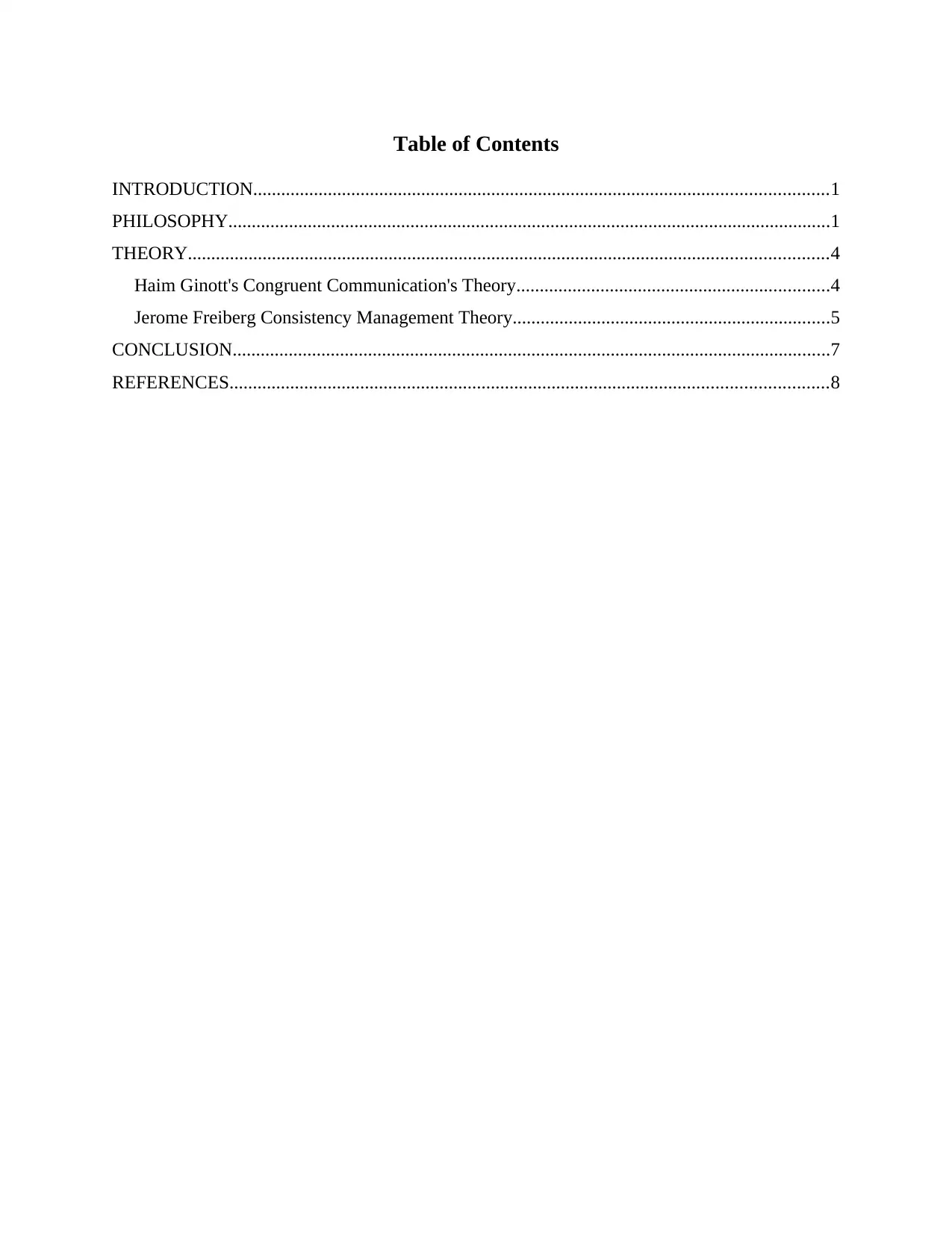
Table of Contents
INTRODUCTION...........................................................................................................................1
PHILOSOPHY.................................................................................................................................1
THEORY.........................................................................................................................................4
Haim Ginott's Congruent Communication's Theory...................................................................4
Jerome Freiberg Consistency Management Theory....................................................................5
CONCLUSION................................................................................................................................7
REFERENCES................................................................................................................................8
INTRODUCTION...........................................................................................................................1
PHILOSOPHY.................................................................................................................................1
THEORY.........................................................................................................................................4
Haim Ginott's Congruent Communication's Theory...................................................................4
Jerome Freiberg Consistency Management Theory....................................................................5
CONCLUSION................................................................................................................................7
REFERENCES................................................................................................................................8

INTRODUCTION
Classroom Management refers to an effective practice of planning and implementing
several strategies related to providing better learning within a class. Moreover, it is also
necessary in context with developing a self disciplined and ethical environment in the workplace.
The report below is based on philosophy associated with learning as well as analysis of theories
to provide a strong and appropriate base to philosophies.
PHILOSOPHY
(1) Introduction
The nature/needs of young people
Youth age is a time period when an individual lays in between childhood and adulthood.
It is also reflects individuals in terms of appearance, spirit, freshness and vibe which are some of
its characteristics. Every young individual has their own set of strengths, needs, weaknesses and
interest that affects their behaviour (Lystbaek, 2018). It has been witnessed that all young people
possess diverse range of personalities, thus, they are alike in many different ways. These
individuals mainly have five basic needs that include belongingness, independence, achievement,
new experiences and affection. Thus, all these elements states that young individual have a
certain kind of enthusiasm. Further, it has been seen that young people are full of emotions that
constantly change which directs their behaviour. Need of young people include being get loved
and live as an independent and thus, they are required to independently lead towards learning
after a certain extent of control.
The role of the teacher
The formative role of a teacher includes utilisation of classroom presentations and
instructions as to further aid students to learn and apply concepts relating to certain subjects.
There are mainly five roles of teachers that include support, resource, helping hand, mentor and
learner (Assessment, 2018). In addition to this, the most important role that has been process by
teacher includes motivating students and young individuals as to develop their physical as well
as mental skills. This will help them to further improve their behaviour. Moreover, this could be
nurtured by developing a prominent environment where students are encouraged to learn. Along
with this teacher plays most important role to encourage young students and to increase learning
experiences which is related to self understanding. A proper communication channel must be
1
Classroom Management refers to an effective practice of planning and implementing
several strategies related to providing better learning within a class. Moreover, it is also
necessary in context with developing a self disciplined and ethical environment in the workplace.
The report below is based on philosophy associated with learning as well as analysis of theories
to provide a strong and appropriate base to philosophies.
PHILOSOPHY
(1) Introduction
The nature/needs of young people
Youth age is a time period when an individual lays in between childhood and adulthood.
It is also reflects individuals in terms of appearance, spirit, freshness and vibe which are some of
its characteristics. Every young individual has their own set of strengths, needs, weaknesses and
interest that affects their behaviour (Lystbaek, 2018). It has been witnessed that all young people
possess diverse range of personalities, thus, they are alike in many different ways. These
individuals mainly have five basic needs that include belongingness, independence, achievement,
new experiences and affection. Thus, all these elements states that young individual have a
certain kind of enthusiasm. Further, it has been seen that young people are full of emotions that
constantly change which directs their behaviour. Need of young people include being get loved
and live as an independent and thus, they are required to independently lead towards learning
after a certain extent of control.
The role of the teacher
The formative role of a teacher includes utilisation of classroom presentations and
instructions as to further aid students to learn and apply concepts relating to certain subjects.
There are mainly five roles of teachers that include support, resource, helping hand, mentor and
learner (Assessment, 2018). In addition to this, the most important role that has been process by
teacher includes motivating students and young individuals as to develop their physical as well
as mental skills. This will help them to further improve their behaviour. Moreover, this could be
nurtured by developing a prominent environment where students are encouraged to learn. Along
with this teacher plays most important role to encourage young students and to increase learning
experiences which is related to self understanding. A proper communication channel must be
1
⊘ This is a preview!⊘
Do you want full access?
Subscribe today to unlock all pages.

Trusted by 1+ million students worldwide
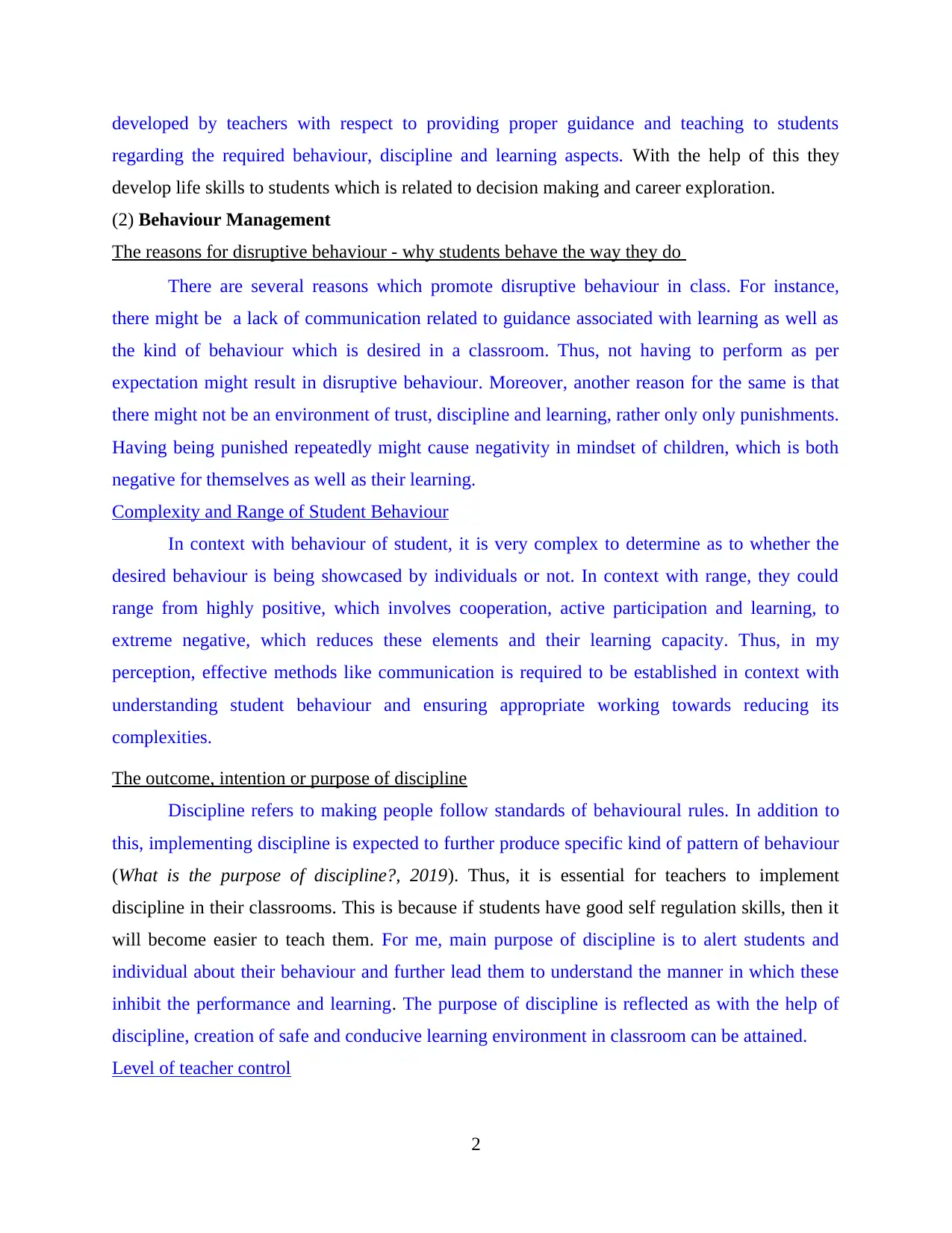
developed by teachers with respect to providing proper guidance and teaching to students
regarding the required behaviour, discipline and learning aspects. With the help of this they
develop life skills to students which is related to decision making and career exploration.
(2) Behaviour Management
The reasons for disruptive behaviour - why students behave the way they do
There are several reasons which promote disruptive behaviour in class. For instance,
there might be a lack of communication related to guidance associated with learning as well as
the kind of behaviour which is desired in a classroom. Thus, not having to perform as per
expectation might result in disruptive behaviour. Moreover, another reason for the same is that
there might not be an environment of trust, discipline and learning, rather only only punishments.
Having being punished repeatedly might cause negativity in mindset of children, which is both
negative for themselves as well as their learning.
Complexity and Range of Student Behaviour
In context with behaviour of student, it is very complex to determine as to whether the
desired behaviour is being showcased by individuals or not. In context with range, they could
range from highly positive, which involves cooperation, active participation and learning, to
extreme negative, which reduces these elements and their learning capacity. Thus, in my
perception, effective methods like communication is required to be established in context with
understanding student behaviour and ensuring appropriate working towards reducing its
complexities.
The outcome, intention or purpose of discipline
Discipline refers to making people follow standards of behavioural rules. In addition to
this, implementing discipline is expected to further produce specific kind of pattern of behaviour
(What is the purpose of discipline?, 2019). Thus, it is essential for teachers to implement
discipline in their classrooms. This is because if students have good self regulation skills, then it
will become easier to teach them. For me, main purpose of discipline is to alert students and
individual about their behaviour and further lead them to understand the manner in which these
inhibit the performance and learning. The purpose of discipline is reflected as with the help of
discipline, creation of safe and conducive learning environment in classroom can be attained.
Level of teacher control
2
regarding the required behaviour, discipline and learning aspects. With the help of this they
develop life skills to students which is related to decision making and career exploration.
(2) Behaviour Management
The reasons for disruptive behaviour - why students behave the way they do
There are several reasons which promote disruptive behaviour in class. For instance,
there might be a lack of communication related to guidance associated with learning as well as
the kind of behaviour which is desired in a classroom. Thus, not having to perform as per
expectation might result in disruptive behaviour. Moreover, another reason for the same is that
there might not be an environment of trust, discipline and learning, rather only only punishments.
Having being punished repeatedly might cause negativity in mindset of children, which is both
negative for themselves as well as their learning.
Complexity and Range of Student Behaviour
In context with behaviour of student, it is very complex to determine as to whether the
desired behaviour is being showcased by individuals or not. In context with range, they could
range from highly positive, which involves cooperation, active participation and learning, to
extreme negative, which reduces these elements and their learning capacity. Thus, in my
perception, effective methods like communication is required to be established in context with
understanding student behaviour and ensuring appropriate working towards reducing its
complexities.
The outcome, intention or purpose of discipline
Discipline refers to making people follow standards of behavioural rules. In addition to
this, implementing discipline is expected to further produce specific kind of pattern of behaviour
(What is the purpose of discipline?, 2019). Thus, it is essential for teachers to implement
discipline in their classrooms. This is because if students have good self regulation skills, then it
will become easier to teach them. For me, main purpose of discipline is to alert students and
individual about their behaviour and further lead them to understand the manner in which these
inhibit the performance and learning. The purpose of discipline is reflected as with the help of
discipline, creation of safe and conducive learning environment in classroom can be attained.
Level of teacher control
2
Paraphrase This Document
Need a fresh take? Get an instant paraphrase of this document with our AI Paraphraser
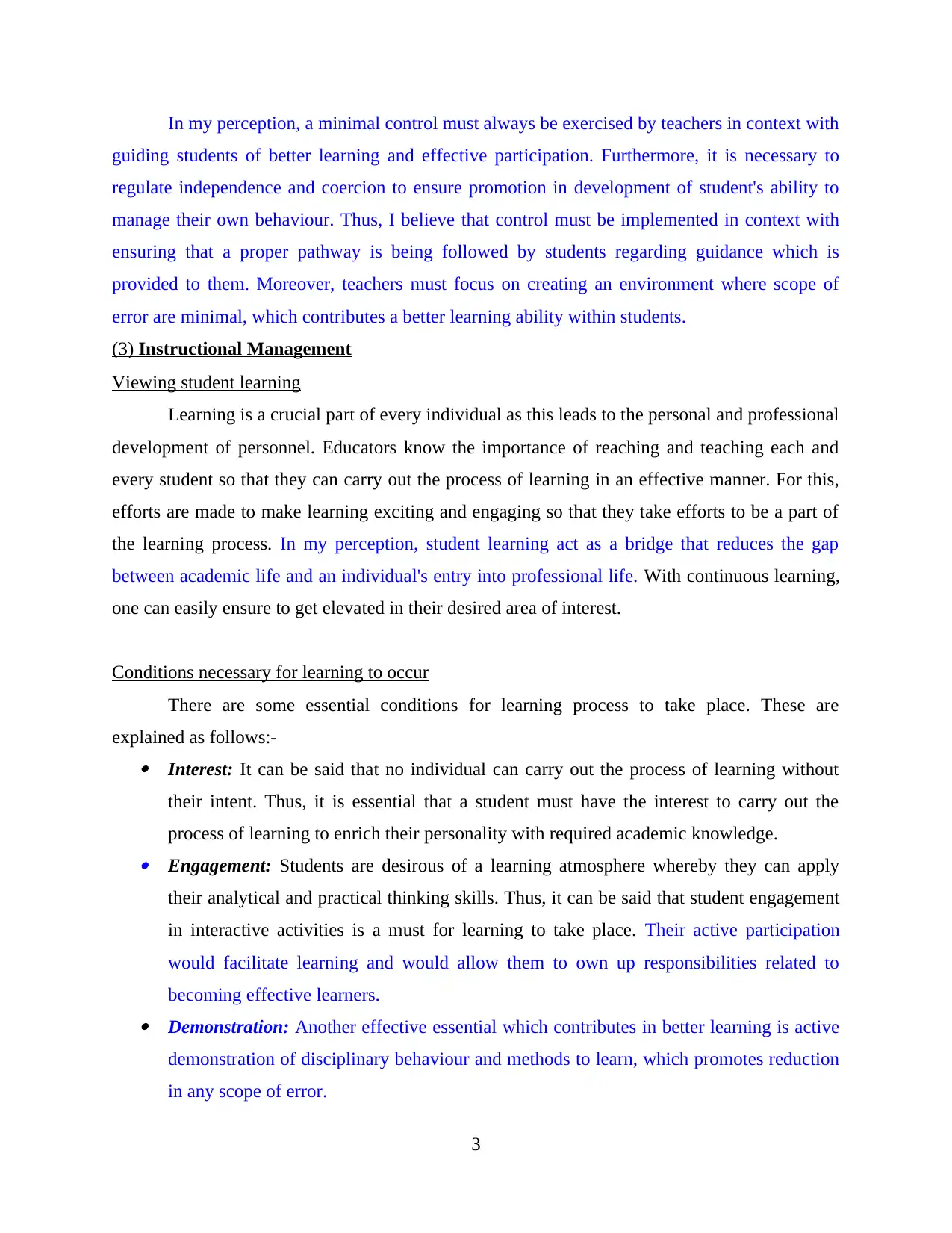
In my perception, a minimal control must always be exercised by teachers in context with
guiding students of better learning and effective participation. Furthermore, it is necessary to
regulate independence and coercion to ensure promotion in development of student's ability to
manage their own behaviour. Thus, I believe that control must be implemented in context with
ensuring that a proper pathway is being followed by students regarding guidance which is
provided to them. Moreover, teachers must focus on creating an environment where scope of
error are minimal, which contributes a better learning ability within students.
(3) Instructional Management
Viewing student learning
Learning is a crucial part of every individual as this leads to the personal and professional
development of personnel. Educators know the importance of reaching and teaching each and
every student so that they can carry out the process of learning in an effective manner. For this,
efforts are made to make learning exciting and engaging so that they take efforts to be a part of
the learning process. In my perception, student learning act as a bridge that reduces the gap
between academic life and an individual's entry into professional life. With continuous learning,
one can easily ensure to get elevated in their desired area of interest.
Conditions necessary for learning to occur
There are some essential conditions for learning process to take place. These are
explained as follows:- Interest: It can be said that no individual can carry out the process of learning without
their intent. Thus, it is essential that a student must have the interest to carry out the
process of learning to enrich their personality with required academic knowledge. Engagement: Students are desirous of a learning atmosphere whereby they can apply
their analytical and practical thinking skills. Thus, it can be said that student engagement
in interactive activities is a must for learning to take place. Their active participation
would facilitate learning and would allow them to own up responsibilities related to
becoming effective learners. Demonstration: Another effective essential which contributes in better learning is active
demonstration of disciplinary behaviour and methods to learn, which promotes reduction
in any scope of error.
3
guiding students of better learning and effective participation. Furthermore, it is necessary to
regulate independence and coercion to ensure promotion in development of student's ability to
manage their own behaviour. Thus, I believe that control must be implemented in context with
ensuring that a proper pathway is being followed by students regarding guidance which is
provided to them. Moreover, teachers must focus on creating an environment where scope of
error are minimal, which contributes a better learning ability within students.
(3) Instructional Management
Viewing student learning
Learning is a crucial part of every individual as this leads to the personal and professional
development of personnel. Educators know the importance of reaching and teaching each and
every student so that they can carry out the process of learning in an effective manner. For this,
efforts are made to make learning exciting and engaging so that they take efforts to be a part of
the learning process. In my perception, student learning act as a bridge that reduces the gap
between academic life and an individual's entry into professional life. With continuous learning,
one can easily ensure to get elevated in their desired area of interest.
Conditions necessary for learning to occur
There are some essential conditions for learning process to take place. These are
explained as follows:- Interest: It can be said that no individual can carry out the process of learning without
their intent. Thus, it is essential that a student must have the interest to carry out the
process of learning to enrich their personality with required academic knowledge. Engagement: Students are desirous of a learning atmosphere whereby they can apply
their analytical and practical thinking skills. Thus, it can be said that student engagement
in interactive activities is a must for learning to take place. Their active participation
would facilitate learning and would allow them to own up responsibilities related to
becoming effective learners. Demonstration: Another effective essential which contributes in better learning is active
demonstration of disciplinary behaviour and methods to learn, which promotes reduction
in any scope of error.
3
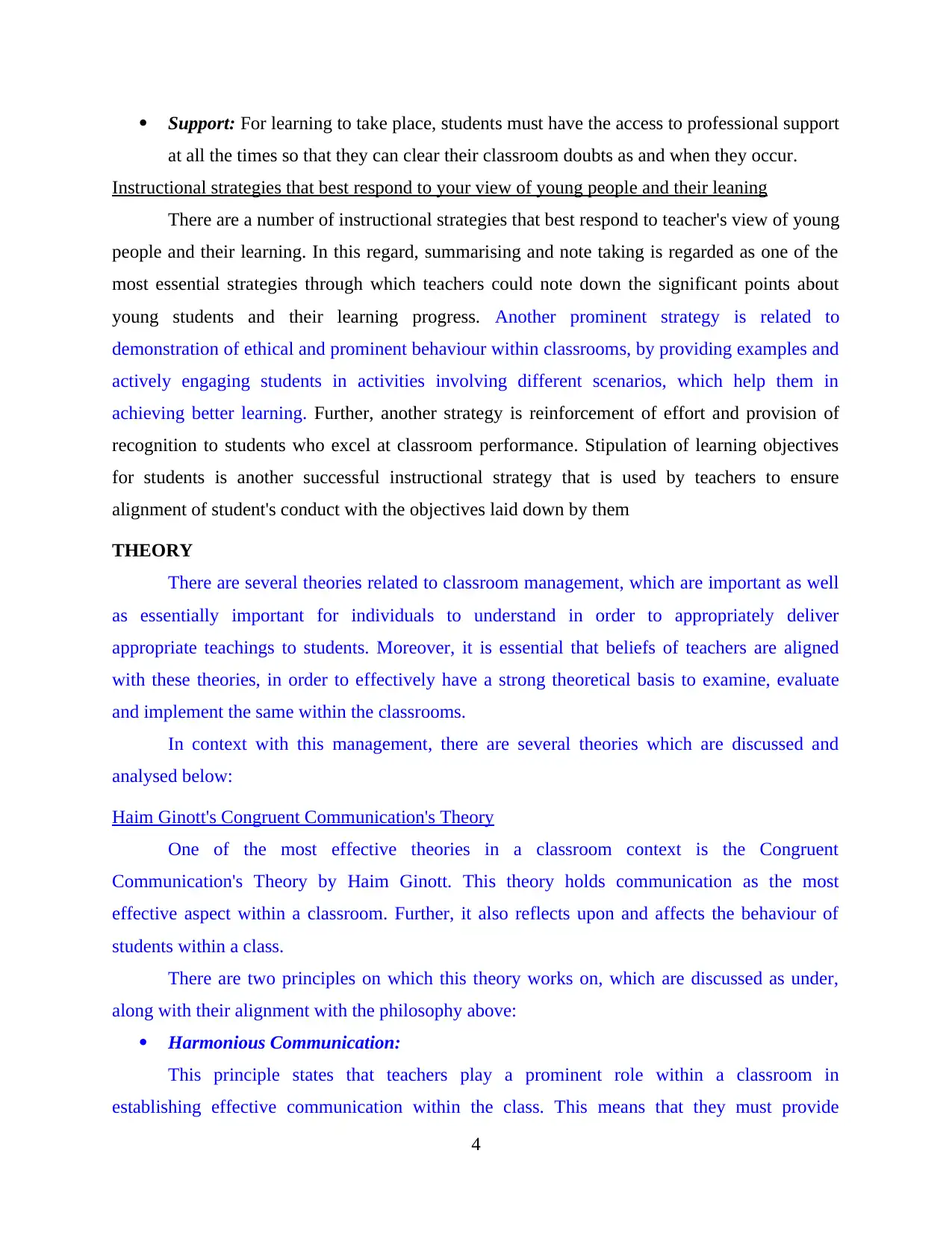
Support: For learning to take place, students must have the access to professional support
at all the times so that they can clear their classroom doubts as and when they occur.
Instructional strategies that best respond to your view of young people and their leaning
There are a number of instructional strategies that best respond to teacher's view of young
people and their learning. In this regard, summarising and note taking is regarded as one of the
most essential strategies through which teachers could note down the significant points about
young students and their learning progress. Another prominent strategy is related to
demonstration of ethical and prominent behaviour within classrooms, by providing examples and
actively engaging students in activities involving different scenarios, which help them in
achieving better learning. Further, another strategy is reinforcement of effort and provision of
recognition to students who excel at classroom performance. Stipulation of learning objectives
for students is another successful instructional strategy that is used by teachers to ensure
alignment of student's conduct with the objectives laid down by them
THEORY
There are several theories related to classroom management, which are important as well
as essentially important for individuals to understand in order to appropriately deliver
appropriate teachings to students. Moreover, it is essential that beliefs of teachers are aligned
with these theories, in order to effectively have a strong theoretical basis to examine, evaluate
and implement the same within the classrooms.
In context with this management, there are several theories which are discussed and
analysed below:
Haim Ginott's Congruent Communication's Theory
One of the most effective theories in a classroom context is the Congruent
Communication's Theory by Haim Ginott. This theory holds communication as the most
effective aspect within a classroom. Further, it also reflects upon and affects the behaviour of
students within a class.
There are two principles on which this theory works on, which are discussed as under,
along with their alignment with the philosophy above:
Harmonious Communication:
This principle states that teachers play a prominent role within a classroom in
establishing effective communication within the class. This means that they must provide
4
at all the times so that they can clear their classroom doubts as and when they occur.
Instructional strategies that best respond to your view of young people and their leaning
There are a number of instructional strategies that best respond to teacher's view of young
people and their learning. In this regard, summarising and note taking is regarded as one of the
most essential strategies through which teachers could note down the significant points about
young students and their learning progress. Another prominent strategy is related to
demonstration of ethical and prominent behaviour within classrooms, by providing examples and
actively engaging students in activities involving different scenarios, which help them in
achieving better learning. Further, another strategy is reinforcement of effort and provision of
recognition to students who excel at classroom performance. Stipulation of learning objectives
for students is another successful instructional strategy that is used by teachers to ensure
alignment of student's conduct with the objectives laid down by them
THEORY
There are several theories related to classroom management, which are important as well
as essentially important for individuals to understand in order to appropriately deliver
appropriate teachings to students. Moreover, it is essential that beliefs of teachers are aligned
with these theories, in order to effectively have a strong theoretical basis to examine, evaluate
and implement the same within the classrooms.
In context with this management, there are several theories which are discussed and
analysed below:
Haim Ginott's Congruent Communication's Theory
One of the most effective theories in a classroom context is the Congruent
Communication's Theory by Haim Ginott. This theory holds communication as the most
effective aspect within a classroom. Further, it also reflects upon and affects the behaviour of
students within a class.
There are two principles on which this theory works on, which are discussed as under,
along with their alignment with the philosophy above:
Harmonious Communication:
This principle states that teachers play a prominent role within a classroom in
establishing effective communication within the class. This means that they must provide
4
⊘ This is a preview!⊘
Do you want full access?
Subscribe today to unlock all pages.

Trusted by 1+ million students worldwide

information to students regarding their expectations as well as desired behaviour in class.
Moreover, the problem must be focused upon rather than individuals to ensure positive
behaviour within the classroom. This principle, hence, completely aligns with the philosophies
discussed above. Reason for the same is that as discussed, the complexity of behaviours of
students, according to me, is related to ineffective communication. Thus, this principle could
help in enhancing the philosophy and could induce a better teaching and learning environment
within the future.
Demonstration of Behaviours to promote cooperation in class:
Another principle associated within this theory is that a clear demonstration must be
provided by teachers in relation to all the behaviours that they wish to promote within the class.
This would further enhance cooperation in class. Moreover, this could contribute to essentials
that are required to facilitate learning within a classroom and could be a definitive instructional
strategy. Hence, my philosophy of classroom management aligns with both the principles of this
theory and hence, could help me in delivering better teaching in future.
Promotion of Discipline as an alternative:
This principle is associated with having discipline as a prime tool to promote discipline,
rather than punishment. Having promoting this element would help the students in behaving
according to the preset norms and there won't be any sort of coercion which would be
implemented within a classroom. As mentioned above, I also believe in exercising a very brief
and lenient control over students in order to help them understand the ethical and effective
behaviour themselves.
Thus, tenets of this theory appropriately align with my philosophy of teaching. However,
emphasising on these would allow me to ensure a better classroom management in future, that
would be beneficial for both me as well as students in long term.
Jerome Freiberg Consistency Management Theory
This Theory follows the principles that active learning must be an integral part for
making children a better learner. There must be limited or no passiveness in their learning
process. This is because active learning process would ensure cooperation, participation as well
as support from students. As for consistency, the theory works effectively on aspect that each
pupil requires a certain extent of consistency between responsibility, self-discipline and ideas.
There is a link between this theory and Congruent Management theory above, that both these
5
Moreover, the problem must be focused upon rather than individuals to ensure positive
behaviour within the classroom. This principle, hence, completely aligns with the philosophies
discussed above. Reason for the same is that as discussed, the complexity of behaviours of
students, according to me, is related to ineffective communication. Thus, this principle could
help in enhancing the philosophy and could induce a better teaching and learning environment
within the future.
Demonstration of Behaviours to promote cooperation in class:
Another principle associated within this theory is that a clear demonstration must be
provided by teachers in relation to all the behaviours that they wish to promote within the class.
This would further enhance cooperation in class. Moreover, this could contribute to essentials
that are required to facilitate learning within a classroom and could be a definitive instructional
strategy. Hence, my philosophy of classroom management aligns with both the principles of this
theory and hence, could help me in delivering better teaching in future.
Promotion of Discipline as an alternative:
This principle is associated with having discipline as a prime tool to promote discipline,
rather than punishment. Having promoting this element would help the students in behaving
according to the preset norms and there won't be any sort of coercion which would be
implemented within a classroom. As mentioned above, I also believe in exercising a very brief
and lenient control over students in order to help them understand the ethical and effective
behaviour themselves.
Thus, tenets of this theory appropriately align with my philosophy of teaching. However,
emphasising on these would allow me to ensure a better classroom management in future, that
would be beneficial for both me as well as students in long term.
Jerome Freiberg Consistency Management Theory
This Theory follows the principles that active learning must be an integral part for
making children a better learner. There must be limited or no passiveness in their learning
process. This is because active learning process would ensure cooperation, participation as well
as support from students. As for consistency, the theory works effectively on aspect that each
pupil requires a certain extent of consistency between responsibility, self-discipline and ideas.
There is a link between this theory and Congruent Management theory above, that both these
5
Paraphrase This Document
Need a fresh take? Get an instant paraphrase of this document with our AI Paraphraser

models focus on inducing prominent and necessary behaviour, not out of fear of punishment, but
due to creation of environment for the same.
There are five themes associated with this theory that are discussed as under: Prevention: This theme relates with complete prevention of problems, rather than solving
them, thus, promoting a reduction in need of intervention. Thus, it could be an active
strategy in context with ensuring that students learn in a way which does not involve
aspects that tend to lead into ineffectiveness. This could be achieved through promotion
of discipline, which, as mentioned above, an essential within the foundation of learning. Caring: It promotes development of a caring and positive environment which would lay
foundation of reform within students. It aligns with my philosophy above as I believe a
crucial role of teacher is to develop a prominent environment and hence, this theme could
enhance my philosophy in a better manner. Cooperation: Within this theme, students are required to be made an active part (citizen)
of the class rather than a tourist, it leads to their active involvement, learning and higher
opportunities in context with self-discipline. This requires exercising minimum control
over students, constraint to only promoting expectations as mentioned above in
communications theory and leading to problem intervention, thus, ensuring involvement
of students. Organisation: In order to build self-discipline within the classroom, this theme suggests
a mutual responsibility that must be promoted which would contribute at both teaching as
well as active learning. Having responsibilities would be helping in reducing the
complexity of student behaviour. This would contribute in enhancing the philosophy
related to classroom management.
Community: This theme highlights active participation of community as well as parents
which are also an appropriate part of the learning element. Having their support would be
helping in better understanding the needs and requirements of young people better.
Thus, both the theories appropriately aligns, informs and enhances my philosophies
regarding teaching. Moreover, application of both these theories simultaneously is quite effective
due to them being interrelated regarding several attributes. Therefore, having these in practice
would allow me in a better classroom management in future, which would facilitate better
learning.
6
due to creation of environment for the same.
There are five themes associated with this theory that are discussed as under: Prevention: This theme relates with complete prevention of problems, rather than solving
them, thus, promoting a reduction in need of intervention. Thus, it could be an active
strategy in context with ensuring that students learn in a way which does not involve
aspects that tend to lead into ineffectiveness. This could be achieved through promotion
of discipline, which, as mentioned above, an essential within the foundation of learning. Caring: It promotes development of a caring and positive environment which would lay
foundation of reform within students. It aligns with my philosophy above as I believe a
crucial role of teacher is to develop a prominent environment and hence, this theme could
enhance my philosophy in a better manner. Cooperation: Within this theme, students are required to be made an active part (citizen)
of the class rather than a tourist, it leads to their active involvement, learning and higher
opportunities in context with self-discipline. This requires exercising minimum control
over students, constraint to only promoting expectations as mentioned above in
communications theory and leading to problem intervention, thus, ensuring involvement
of students. Organisation: In order to build self-discipline within the classroom, this theme suggests
a mutual responsibility that must be promoted which would contribute at both teaching as
well as active learning. Having responsibilities would be helping in reducing the
complexity of student behaviour. This would contribute in enhancing the philosophy
related to classroom management.
Community: This theme highlights active participation of community as well as parents
which are also an appropriate part of the learning element. Having their support would be
helping in better understanding the needs and requirements of young people better.
Thus, both the theories appropriately aligns, informs and enhances my philosophies
regarding teaching. Moreover, application of both these theories simultaneously is quite effective
due to them being interrelated regarding several attributes. Therefore, having these in practice
would allow me in a better classroom management in future, which would facilitate better
learning.
6
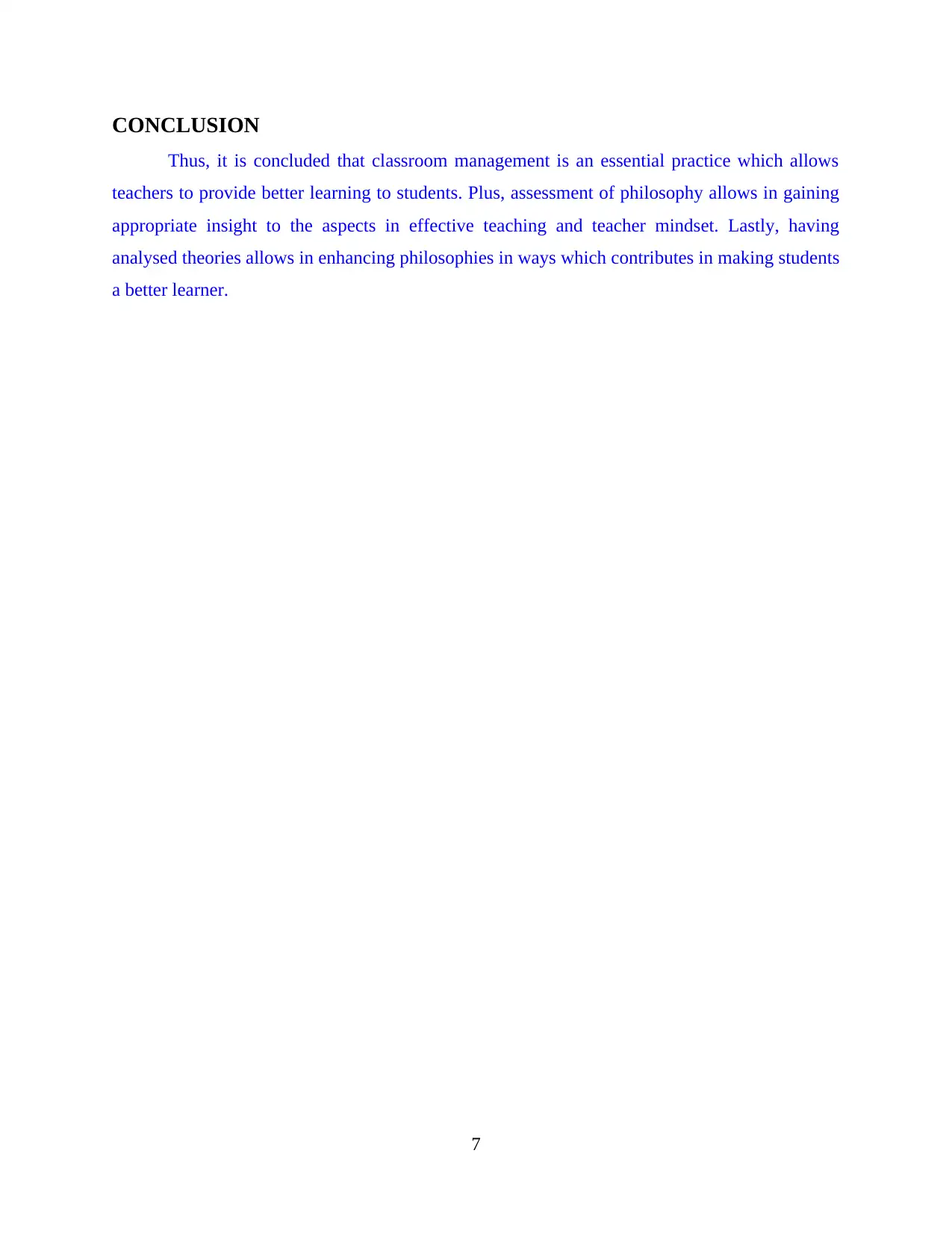
CONCLUSION
Thus, it is concluded that classroom management is an essential practice which allows
teachers to provide better learning to students. Plus, assessment of philosophy allows in gaining
appropriate insight to the aspects in effective teaching and teacher mindset. Lastly, having
analysed theories allows in enhancing philosophies in ways which contributes in making students
a better learner.
7
Thus, it is concluded that classroom management is an essential practice which allows
teachers to provide better learning to students. Plus, assessment of philosophy allows in gaining
appropriate insight to the aspects in effective teaching and teacher mindset. Lastly, having
analysed theories allows in enhancing philosophies in ways which contributes in making students
a better learner.
7
⊘ This is a preview!⊘
Do you want full access?
Subscribe today to unlock all pages.

Trusted by 1+ million students worldwide
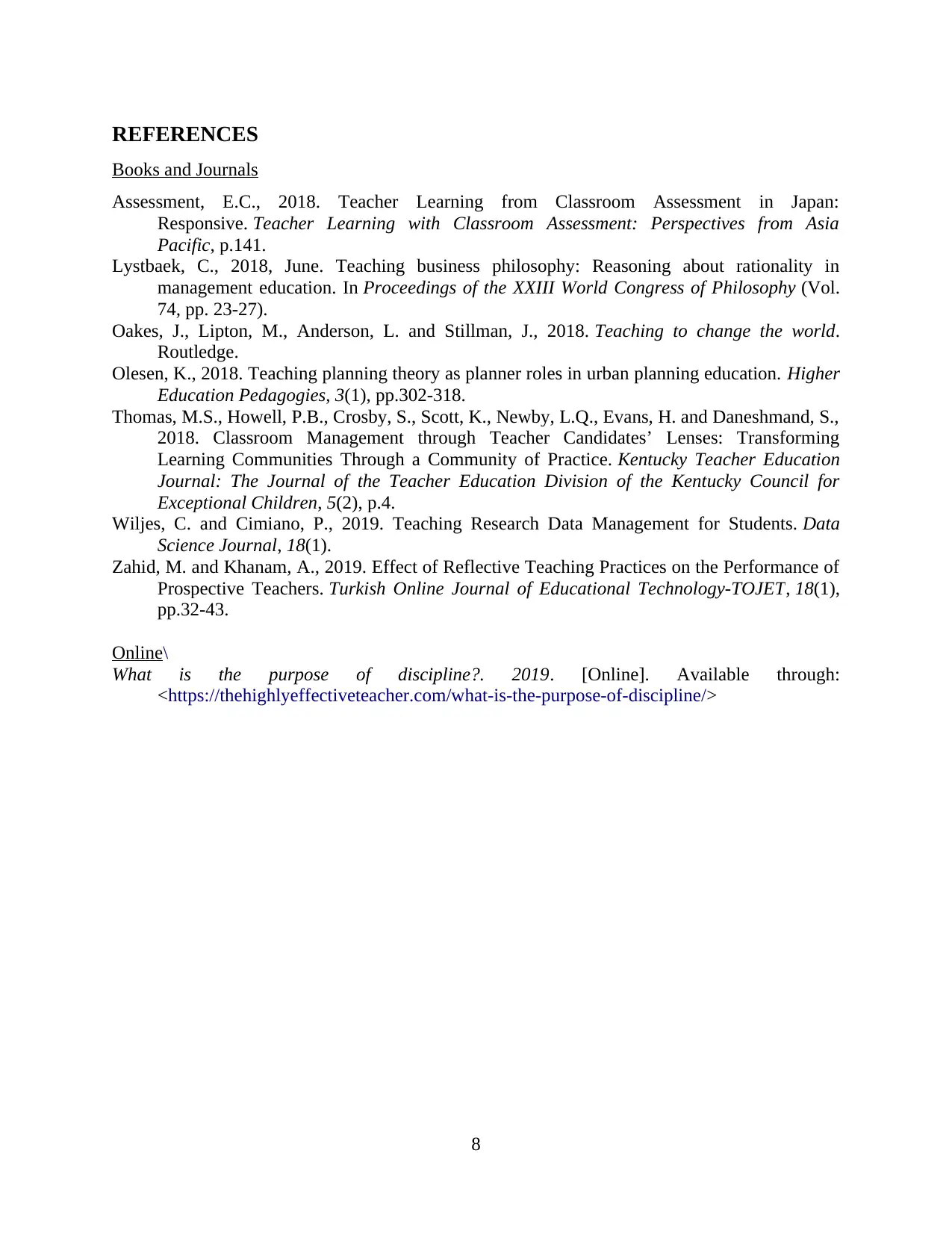
REFERENCES
Books and Journals
Assessment, E.C., 2018. Teacher Learning from Classroom Assessment in Japan:
Responsive. Teacher Learning with Classroom Assessment: Perspectives from Asia
Pacific, p.141.
Lystbaek, C., 2018, June. Teaching business philosophy: Reasoning about rationality in
management education. In Proceedings of the XXIII World Congress of Philosophy (Vol.
74, pp. 23-27).
Oakes, J., Lipton, M., Anderson, L. and Stillman, J., 2018. Teaching to change the world.
Routledge.
Olesen, K., 2018. Teaching planning theory as planner roles in urban planning education. Higher
Education Pedagogies, 3(1), pp.302-318.
Thomas, M.S., Howell, P.B., Crosby, S., Scott, K., Newby, L.Q., Evans, H. and Daneshmand, S.,
2018. Classroom Management through Teacher Candidates’ Lenses: Transforming
Learning Communities Through a Community of Practice. Kentucky Teacher Education
Journal: The Journal of the Teacher Education Division of the Kentucky Council for
Exceptional Children, 5(2), p.4.
Wiljes, C. and Cimiano, P., 2019. Teaching Research Data Management for Students. Data
Science Journal, 18(1).
Zahid, M. and Khanam, A., 2019. Effect of Reflective Teaching Practices on the Performance of
Prospective Teachers. Turkish Online Journal of Educational Technology-TOJET, 18(1),
pp.32-43.
Online\
What is the purpose of discipline?. 2019. [Online]. Available through:
<https://thehighlyeffectiveteacher.com/what-is-the-purpose-of-discipline/>
8
Books and Journals
Assessment, E.C., 2018. Teacher Learning from Classroom Assessment in Japan:
Responsive. Teacher Learning with Classroom Assessment: Perspectives from Asia
Pacific, p.141.
Lystbaek, C., 2018, June. Teaching business philosophy: Reasoning about rationality in
management education. In Proceedings of the XXIII World Congress of Philosophy (Vol.
74, pp. 23-27).
Oakes, J., Lipton, M., Anderson, L. and Stillman, J., 2018. Teaching to change the world.
Routledge.
Olesen, K., 2018. Teaching planning theory as planner roles in urban planning education. Higher
Education Pedagogies, 3(1), pp.302-318.
Thomas, M.S., Howell, P.B., Crosby, S., Scott, K., Newby, L.Q., Evans, H. and Daneshmand, S.,
2018. Classroom Management through Teacher Candidates’ Lenses: Transforming
Learning Communities Through a Community of Practice. Kentucky Teacher Education
Journal: The Journal of the Teacher Education Division of the Kentucky Council for
Exceptional Children, 5(2), p.4.
Wiljes, C. and Cimiano, P., 2019. Teaching Research Data Management for Students. Data
Science Journal, 18(1).
Zahid, M. and Khanam, A., 2019. Effect of Reflective Teaching Practices on the Performance of
Prospective Teachers. Turkish Online Journal of Educational Technology-TOJET, 18(1),
pp.32-43.
Online\
What is the purpose of discipline?. 2019. [Online]. Available through:
<https://thehighlyeffectiveteacher.com/what-is-the-purpose-of-discipline/>
8
1 out of 10
Related Documents
Your All-in-One AI-Powered Toolkit for Academic Success.
+13062052269
info@desklib.com
Available 24*7 on WhatsApp / Email
![[object Object]](/_next/static/media/star-bottom.7253800d.svg)
Unlock your academic potential
Copyright © 2020–2026 A2Z Services. All Rights Reserved. Developed and managed by ZUCOL.





